Moral Orel: Repression in Moralton
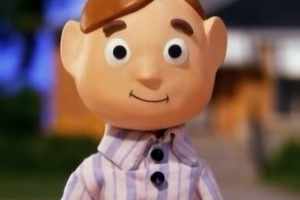
America is a country founded on patriotic lore and systematic repression. Even in this age of information, we continue to propagate mythology to the roots of our nation. For all of the claims of freedom and pursuing happiness, ignorance and repression of truth are often deemed more palatable than facts that make some uncomfortable. Repression in America extends to all fields, sowing its seeds and grooming the crops that will force feed the masses. One needs only to look at the recent controversy surrounding Comedy Central’s Stephen Colbert to understand that. Gone are the days of pointed analysis of ignorance; instead we live in a world where the humor is derived from the ignorance itself with little respect to why it is wrong. In practice, this can serve to ridicule the person who misspoke, but unfortunately it creates a world where if you don’t understand it was the fault is placed on the speaker rather than on you. I preface this article this way, because Moral Orel served as one of the last vestiges of true satire in American humor and the focus of its satire is the culture of repression.
To begin, Moral Orel, was a 43 episode claymation series that ran on the Adult Swim block on Cartoon Network. The main character of the show is Orel Puppington, a 12 year old Christian in a town of religious zealots. The first season carries an issue of the day format while seasons two and three began to add nuance to the formula and build to the destruction of the thin veneer keeping Orel in the dark about life in his small town.
In terms of community, Moralton was always intriguing. In their backwards society, everything is centered around repression. A noted point of humor is that their church actually contains a “Repressional,” which they use to confess their sins and then get immediately told to bury their shame. In the context of religion, this seems to just be another running stab at fundamentalist Christianity, but a deeper viewing shows the foundation of the “Repressional” in the society. A t a base level, Moralton can not function with truth; the only thing keeping the town together is the fear that the truth will come to light.
Starting with the center of the town’s religion is Reverend Putty. It becomes apparent throughout the course of the show that Putty hates his lot in life. More so, he holds contempt for the Christian God, as seen not just in his behaviors, but in his office as well. One of the more curious features of his office is his mug, which reads “I hate my boss.” Very overt in tone, but no one in town pays mind to it, because aside from Orel, we never see anyone enter the office. Putty’s resentment of God comes from his “forced” virginity (which was only remedied by Orel) and yet, he never speaks out against God, at least not consciously. At his core, Putty is trapped by his role, as many in Moralton are. He is confined to a life of servitude, repressed by the role he feels he must play.
As pertaining to the show’s protagonist, Orel’s family the Puppingtons are a microcosm of the town at large. Between his parents, we’re shown that Clay and Bloberta are openly loathsome of each other, but are forever trapped together out of their need to keep up appearances. Shapey, Bloberta’s son by Coach Stopframe, is a manic and demanding seven year old who is coddled by his parents to preserve some semblance of peace in their household.
Turning a more critical eye on the family, Bloberta, the matriarch, is shown throughout the show to be cold in her dealings with her husband, but it’s not until season 3 that the audience is given insight into her as a person. She is shown to have forced Clay into marriage, and was the impetus of his alcoholism. Her desire to escape her home and her envy of her friends who were all engaged or married led to her rushed decision. In the episode “Numb,” we’re shown that Bloberta desires anyone else but her husband, immediately propositioning many of the men in Moralton before finally settling on more “archaic” means of self gratification. She eventually gains a connection to Dr. Potterswheel, but it’s for naught as he only was attracted to her wounds—never to her. In the end, she remains ever trapped in her role. When questioned by Orel as to the reasons she married Clay she offhandedly responds “Why not?” She then leaves the room, realizing her son sees through the facade his parents have tried to craft for him.
Contrasting Bloberta is Clay, who is shown to be much more willingly distant. Within the 43 episode series it isn’t until the second to last episode that we see Clay’s job. This again shows the theme of repression carrying through. What we’re shown in “Nesting,” however, is that Clay’s unpopularity is universal within the town as even with an articulate and passionate speech the crowd is unmoved by his pleas. His daily mantra of “Stinking dead-end job” is shown as entirely valid, as he recognizes that he is reviled but knows no one else wants the job. He’s a belligerent, unlikable oaf and yet no one thinks to unseat him.
Among the other people in town we’re shown, there is Dr. Quinton Xavier Potterswheel, who is shown to be grossly incompetent, often medicating his patients into sedation or leaving it in the “hands of God.” Potterswheel’s reliance on God is his crutch, as he is unwilling to accept he is a bad doctor. In cases where his patients are too ill, or he doesn’t know what path to take, instead of owning up to it he foists the responsibility onto God, absolving him of his faults.
Even with the more inviting characters, we see repression coming into constant play. For example, Stephanie, the owner of the Buried Pleasures, is shown on numerous occassions to lead a life of repression. When she first encounters Orel and he wins her over, she has to pierce herself to stop the “maternal pains”. She has to repress the emotion Orel makes her feel. Life cannot function in the Moralton community without repression no matter the faith. It is interesting that Stephanie is the proprietor of Buried Pleasure, as she’s the only onscreen lesbian shown in Moralton. She is also openly lesbian. With all these factors, she would have been a prime target for Ms. Censordoll but, the two never come into contact. Also shown is that aside from Orel, few people actually visit the shop. It stands in contrast with the majority of the town as it is dark and bleak while other buildings in Moralton have a more saturated pastel color palette, seeming almost childish and very inviting.
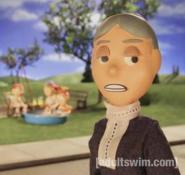
Of the series most interesting characters, Francis Clara Censordoll has to be mentioned. As her name sake (F.C.C.) would imply she censors all. This extends from the library as she routinely conducts protests of the local businesses of Moralton. The threat of a protest from Censordoll is enough to allow her to extort most of the shopkeepers in town and yet, for all of her posturing Ms. Censordoll has the most fluid morality in the town. Even though she works as an agent of repression she is more than willing to engage in acts that suit her needs, whether that be seducing the mayor or gaining access to the object(s) of her obsession. In a weird way, she shows how power can pervert anyone. Her segments in “Alone” would be tragic if not for the pride she takes in her backstory. She’s the only character consistently shown as in control (aside from an encounter with Orel).
As for the other children in Moralton. even they are heavily influenced by the culture of repression. The teacher, Ms. Sculptham has no issue in teaching unverifiable claims and chastises the children is they raise questions when she doesn’t ingraining in them a fear of questioning authority. Of the children aside from Orel, Doughy, Orel’s best friend, is neglected by his parents, develops a warped sense of love, and eventually begins to show warning signs of becoming a sociopath . Tommy, Orel’s “special” friend is pro-science but, in Moralton that makes him “spiritually handicapped” and he is treated as could be expected in Moralton, with revulsion and contempt. Joe Secondopinionson/Bendy is shown to be a stereotypical bully with a fear of aging. He was led to believe his mother was dead out of convenience for his half sister and his senile father.
Contrast this with present day America. Often religious zealotry is met with respect, even reverence unless is betrays societal norms. For all of the castigation of the Westboro Baptist Church, many Americans share their views. For all the freedom of America we still have no national employment protections for members of the LGBT community. For all the “debauchery” shown nowadays we still have a puritanical view of sexuality. What’s more is that drawing attention to shortcomings of our nation is looked at as not only unpatriotic but whiny. Staunch nationalists will engage in pure rhetoric in some cases rather that acknowledge flaws in the system. If flaws are acknowledged, as seen with Clay, they are the fault of some “other.” Whether that other be, “illegals”, “urban americans” or, just foreigners in general, we have a toxicity in the public discourse that does a great disservice to most if not all members of our nation. By creating an environment of repression, we become stagnant and stop leading the way for the world. We instead invite critique of our policies by our allies. How can we argue against, wage war against concepts and practices when we are practitioners of said acts. For all of our religious piety we run the gamut in application often subjecting rules and behaviors to religious test but turning a blind eye when convenience may be sacrificed, similar to adults in Moralton.
With all this in mind, I don’t believe that Dino Stamatopoulos , and to a latter extent Moral Orel is anti-Christian or even Anti-Faith. The thing that marks the faith of Moral Orel isn’t when God doesn’t appear or when characters show the depths of their depravity. Faith in Moral Orel is shown in the good works of men, the dedication of Orel to doing the right thing. No matter how misguided he may be, he never gives up on trying to improve his community. Through his efforts, his arc, we’re shown that faith doesn’t require Church, it requires conviction. Orel gets his happy ending because he’s open to new ideas, because he doesn’t repress himself or his flaws. He wears his faith unlike many in Moralton, and in the real world as well, as a badge of honor, not a tool of punishment. The moral of Moral Orel is whatever you believe in, you must hold to with genuine conviction, or let it go because there is no reason force yourself into a life that you don’t love.
What do you think? Leave a comment.
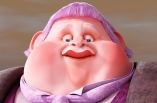




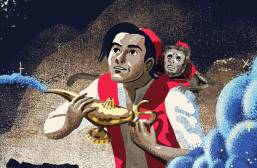

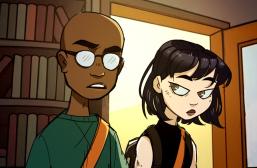



It’s tragic that Moral Orel is so underrated. I gave it some thought and as crazy it is for me to believe (no sarcasm), some people just didn’t like the transition to darker and more heartfelt stories. There are also those people hypersensitive to religion being using in any entertainment medium (especially adult animation), thinking that it’s all anti-religious. And then there are those who didn’t like the first season and just based their thoughts on that.
I’ve been thinking about how the show gets more “serious” with each season, and how the same thing just happened to Check It Out!. Adult Swim is such a great outlet for some of these talented contemporary voices.
This is one dark show. I wouldn’t quite say it’s the darkest per say, but it’s certainly close. The only one I’ve seen to beat it out was a British series by the name of Monkey Dust. Definitely more bleak, but Orel has more emotion behind it, so it’s almost a toss-up.
It was brilliant, but the darker, more serious episodes made me think and were really touching.
Don’t forget Robot Chicken.
The episodes of season 1 were very clever and funny, but as season 2 and season 3 aired, we got to learn more about the people of Moralton and the ironic tone of the show amplified. So many of season 2 and all of season 3 really touched me as showing the inadequacies of human nature and how the strict reverence of religion doesn’t stop the deterioration of the human spirit.
Moral Orel is seriously one of the most well-done, thought-provoking television shows I have ever seen. It deserves so much recognition.
When I first started watching it, I was rather bored because it appeared to be a series of formulaic one-offs: Orel goes to church, Orel misinterprets lesson, Orel reaps havoc, Orel is disciplined partially. I suppose in hindsight, it’s to set up the shockingly dark “Best Christmas Ever.” Of course that was wrecked by Adult Swim airing it first and holding back three other episodes…thanks Williams Street, harbinger for the screw job at the end.
Second season though, the events and plots seemed to startte being interwoven and continuity was established. Especially the episode where Reverend Putty and Stephanie become a family. Then of course came the events of Nature setting up Season 3.
Never was a big fan of morel orel. I liked your article, though. It had something, that I will admit most of the articles I have–thus far–read here didn’t. An actual fucking opinion. You had a pretty clear bias. That’s ok in my opinion. I’m the same way. I have yet to publish an article in the two and one half days I have been a “junior contributor” for the artifice. But, what you wrote helped me to kinda figure out that I can keep my own voice and still write an intelligent observation about a given work of art. I will probably focus on literature, because reading is one of my favorite passed times. I liked your turn of phrases too. You seem to have a tendency to “paint a picture” with your words. I will admit. I got sick of seeing the word “repression”. I could’ve gotten obliterated drunk if I took a shot for everytime you used it. I get that it was the theme of your article, but I’m sure you have an extensive vocabulary. So use it. Either way. Good article. I enjoyed reading something that had a heart and soul. More importantly a message that you wanted to convey about the world around you that you feel you needed to express in writing. Which is in my opinion, “why we write in the first place”.
Nice read. I thought it captured something about Christian fundamentalism and the people who believe in it.
Spot on analysis of all the characters’ relation to the theme of repression. Your conclusion at the end is exactly what I think Dino had in mind with the entire show.
Another testament of the complexity of the show is how there’s vast minor characters that you didn’t get into that represent exactly what you lay out in the article. Particularly Doughy’s parents, who I believe behave like high schoolers because they’re a couple who got married young so sex wouldn’t be a sin. They repress the idea of a real adult marriage so they never have to grow out of their ‘honeymoon phase’.
Great to see such great writing on such an underrated show!
I remember only seeing bits and pieces of Moral Orel before it was canceled. The satiric nature of the show seemed like it was up my alley, but I never really followed it. I enjoyed your analysis and I will try and find time to sit down and actually watch the series. I liked your point that “…religious zealotry is often met with respect, even reverence until it betrays social norms.” Unfortunately, religious extremism/fundamentalism isn’t so different from the “mainstream” as people often think.
Hi, I only recently started watching Moral Orel. and like many others I thought it began gimmicky and almost gave up on it. I’m currently on season 2, and I have to say it is one of the most sharpest, and poignant shows I’ve watched. The manner in which Dino brings up so many issues in what seems to be a basic premise, is quite incredible.
Excellent article!